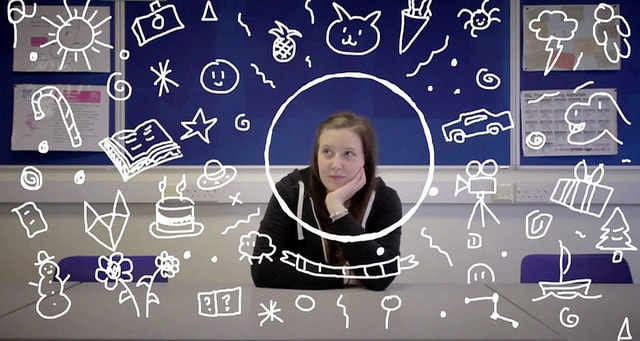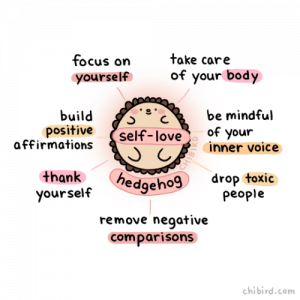by blogger Julia Whiting.
With a new year ahead it can seem daunting for a young person thinking about all the different things coming up in the school/college year. Exams and the pressure of project/coursework completion can lead to anxiety and apprehension as can the social structure of a young person’s life in being accepted and keeping up with the impacts of social media.
This post looks at how to identify anxiety along with how to accept and rationalise it. Catching it and approaching it with realistically is helpful in reducing the long term effects of negative thought cycles.
So what is anxiety?
Anxiety is very much an internal ripple that is often not visible on the outside, but unfortunately it quietly eats away at the thoughts and mood of the person who is the victim, of a sometimes crippling personality trait.
Speaking from experience, anxiety manifested itself in chronic over thinking and over analysing of simple/common situations, which depending on my mood at the time, can result in very warped and self-destructive perceptions of what is going on around me.
Whilst I was at school I found that this put strain on my friendships as I tended to be more sensitive to comments made by others and would react emotionally to events, which other people couldn’t relate to. I was really conscious about my appearance from being bullied and was terrified of presenting my work in class and generally speaking in front of people. As a result I was quite shy and not a very popular child/teenager.
For people who have never suffered with anxiety, this extreme internalised processing of the world around you may seem quite strange. For anxiety sufferers, small comments, certain situations, feelings or regrets stick around like a heavy weight on their mind for long periods of time, zapping them of motivation and self-worth. These self-destructive thought processes are hard to break once they have begun.
How can anxiety be dealt with?
For me, acceptance and rationalisation were key. Being able to identify when anxiety is taking a hold and how this may lead you to react irrationally or in a way that you may later regret, is a wonderful thing. It allows you to regain control when emotions take hold, but this requires practise and most of all tolerance.
Getting frustrated with yourself is often the default position with anxiety and trying to ignore the feelings will only make the situation worse; so I have made a list below of ways that helped me to rationalise my thoughts and move on.
- Take 5 minutes (I would usually take a toilet break) and ask yourself ‘what is making me feel this way?’ the next question is then ‘Is it really that bad?’ and 9 times out of 10 there are much worse situations you could be in. For me it was speaking in front of people and worrying about being judged. I rationalised this fear by telling myself that their thoughts and judgements didn’t matter and slowly I began to believe it. This brought a lot of peace to my older teenage years.
- If the anxiety surfaces whilst you are trying to sleep; write down the fears and concerns and take them out of your mind to tackle the next day. When you are trying to sleep the negative thoughts become exaggerated and blended with dreams and this often magnifies the stress making you tired. And you guess it- tiredness worsens anxiety.
- Talk to someone, someone you can trust and someone who is mature. This may sound strange, but I did talk to my friends at school and often felt that they fuelled my anxiety rather than helping as they would take on the worry/concern rather than rationalising it for me. Talking to my older sister who had more life experience and context to give me was much more helpful; and the fact that she was unbiased and didn’t know my friends or teachers also helped to give me an objective view.
- Reading and focussing on the subjects I enjoyed at school really helped me. I could forget a mean comment or fear quite quickly when reading a good book or throwing myself into an English essay (I loved writing). Absorbing information was therapeutic for me. For you it may be watching films, going for a run, going for a swim, reading blogs online or watching youtube videos. Whatever it is, find yourself a nice distraction and focus on something positive in your life. You will really appreciate it on those days when you feel like things aren’t going too well. You may even develop a talent for something you never knew you had!
These things require time and practise, so don’t give up if the first time you try one of the above, the feeling doesn’t evaporate immediately. Each time you try you will get better and better. It’s all about gaining perspective.
Supporting people with anxiety
Previously when I have spoken about this issue to people I have had very mixed responses; many very kind and sympathetic but others very narrow minded and unaccepting with me being branded as a ‘worrier’ and ‘over thinker’. And yes- these are the symptoms, but unfortunately I cannot just stop worrying and thinking, I can’t stop responding to things in the way that I have been wired to- feeling like this is not a choice.
One thing that I can do is be fully aware of my own personality and be accepting and forgiving of myself. Once I realised that I have a tendency to be paranoid and exaggerate situations and emotions internally, I was able to address my thoughts more logically and give myself time to respond, process and overcome worry.
Unfortunately as a teenager and moving into a young adult, I hadn’t quite understood myself in the way that I do now and that is something that I wish I had mastered earlier in life. I was too busy trying to push myself to be perfect that I didn’t get to know who I really was- but thankfully at 26 I feel like I am getting there.
So next time someone speaks to you about anxiety, try and help them identify the cause and tackle it. It is important that an anxious soul feels that they have a companion, someone who understands and can bring out the goodness. You never know when anxiety will strike and helping others may give you the experience you need to help yourself in the future.
About the author: Julia Whiting is a wellbeing, fashion and lifestyle blogger. Working in the financial services industry after completing a BSc in Economics at the University of Birmingham, Julia is currently developing her journalism skills alongside her day job. Suffering with anxiety and low self-esteem for most of her young adult years she speaks from experience about the issues related to these personality traits and how to cope. Wellbeing posts on her blog focus on positivity and self-improvement allowing you to take charge of your own destiny.
You can follow Julia on Twitter @juliawhiting or visit her website at dejaju.wordpress.com.
Photo: Savannah is raising awareness about social anxiety by The home of Fixers on Flickr under Creative Commons license




